#trans coding
Explore tagged Tumblr posts
Text
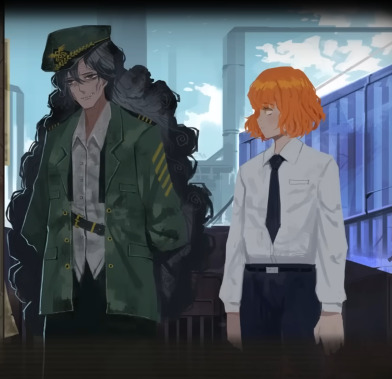
Ishmael is so fucking trans coded. The above is her after feeling her life was empty, quittting her job, and trying to find a new path in life.

This is her now. GOD I have never seen a more obvious egg -> trans girl transition. And now she's found a family too :3
55 notes
·
View notes
Text
Programming for Transfemmes
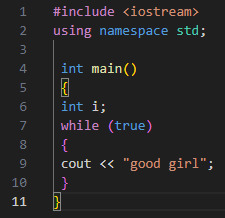
#transgender#trans#transfem#trans woman#trans femme#programmer#c++#c++ meme#trans coded#trans programmer#programmer socks#trans coding
103 notes
·
View notes
Text
Someone has to say it : they knew what they were doing with Sora being so transcoded.
You can't just write all of these transcoded scenes in 2023 by "accident" – especially in a show putting random pride flags in the background to be "allies but we won't take too much risks". Intentional coding really feels like something they would do.
We have a character with pink hair who wears fake cat ears (we all remember the trans girls being obsessed with cat ears era, right ?), changed her name for one being meaningful to her, then ran away from an oppressive government and her unsupportive parents to join a found family. Also, her charadesign's color palette is pink, white and blue.
Not to mention the transcoded as heck scenes :
"Who's Ana ??? Her name is Sora !"
"That's my birth name."
"Oh... Well now I feel dumb-"
(Not the exact quote since I watch the show in french, but you get it)
The way Arin just immediately accepted she had a birth name different from her actual name ??? Just like someone who knows you're trans but didn't know what your deadname was ??? Like. Usually in shows, you would expect a big "you lied to me by using a fake name all these years" drama but here, he just couldn't care less. If this isn't Arin being an ally, then what is it ???
People knowing her from when she lived at Imperium calling her "Ana" just to annoy her ??? But even after learning her birth name, none of her friends ever called her "Ana" ???
The scene in part 2 with her parents and all ??? Hello ???
Her admitting she was still influenced by the fact she felt like disappointing her parents ? Then facing them but they didn't change. They were still thinking Imperium was right and all of the bad things they did just weren't true. Tried to convince her to go back after being horrible with her when she needed their support the most, and insisted on calling her "Ana". So she told them one last time her name was "Sora" then left ???
The whole moral being basically "be who you are" ?????
ALL OF THE SCENES. Her whole arc just feels like transcoding. I refuse to believe this wasn't on purpose.
Edit : feels like they're using a not canonically trans character to normalize trans experiences and I'm here for it
#ninjago#lego ninjago#ninjago dragons rising#lego ninjago dragons rising#dragons rising#dragons rising spoilers#ninjago sora#sora ninjago#trans coded#trans coding#trans headcanon#queer coding
253 notes
·
View notes
Text
why mizu is, in fact, not cis
Everyone is very angry at everyone about how to see or not see Mizu’s identity; being unable to shut up, and having fixated on the show a bit, i’m excited to finally join my first to-the-death-tumblr-discourse-battle.
I'm going to use mostly he/him for Mizu, but please read the premise below. Read the colored strings of text 😭
The main argument for Mizu being a woman is that which has as its basis the fact that cross-dressing is for Mizu an external need: for one, it is a need for protection from patriarchal bonds; secondly, it is a need for independence - Akemi’s story is one of independence as well, of feminine independence, and we have more than one woman pursuing such thing; we could go on with an analysis of brothels as a feminine space, but, alas - and thirdly, it is a need of obligation: Mizu needs to maintain the masculine identity in order to attain the object of his vow.
I find, however, that while the argument stands as perfectly sound (and as canon) it isn��t exhaustive enough of the layered experience of gender in BES.
The trans coding is simply undeniable to me, whether it was intentional or not. I do not mean to say that Mizu is a binary trans man; that would be an approach as reductionist as confirming she is exclusively a woman. However, I find that some behaviours of Mizu’s are coded as dysphoric reactions.
Most of my justifications for this reasoning come from episodes 2, 5 and 8.
In episode 2,
Ringo is vowing to never reveal Mizu’s secret: “I’ll never tell anybody you’re a g-“; and as soon as he’s about to say girl, Mizu is just as ready to slice his throat. Mizu being worried about someone else hearing or witnessing the interaction doesn’t seem completely plausible to me: they’re alone in snowy woods, and, most likely, Mizu wouldn’t have confirmed time and again how readily he’d kill Ringo.
Then comes episode 5,
which is in my opinion the most layered and the most exhaustive in regards to Mizu’s experience of gender, especially regarding his experience of the feminine. First and foremost, it tells the ultimate teaching: that gender isn’t but a performance, just as the gender roles are portrayed through theatre in the episode. As for the dysphoric reaction, it's the whole thing. Mizu is miserable even when we suppose that the marriage could be a relatively happy time. That's another reason why I suppose the puppet theatre tells Mizu's internal sense of self as well (see paragraph 4).
(And, about gender being performative, see how kabuki theatre was born in the Edo period and how, before being banned from acting, women cross-dressed to play male characters, and men cross-dressed to play female characters. See “professional transvestites” trained to be prostitutes, Kagema being trained from a young age to „act" like members of the other sex; see how by the beginning of the 18th century AFAB sex workers would try to figure out a way to set themselves apart from wakashu, creating an entirely new space for female crossdressers in the adult entertainment sphere; see ukiyo-e representations - chigo monogatari and yukiyo-zoshi literature; stories by Ihara Saikaku that are full of "transgender behaviours" and more)
Back to ep 5:
1. Theme of performance
The theme of performance, which also is the one of Mizu performing femininity for Mikio (in function of the well-being of Mizu’s mother), but being at once unable to suppress masculinity as the only space in which Mizu seems to be comfortable: e.g., it’s a little detail, but Mizu’s only good in the kitchen when cutting vegetables, because comfortable with blades, certainly not with cooking; again Mizu having to perform femininity is when he does makeup to “make-up”, to soften Mikio’s spirit, who feels invalidated by Mizu’s masculinity when it starts to interfere with his pride, and such other details; I even thought of the sword as a symbol for ��learned” masculinity: the first time this thought occurred was when it was characterized by sensuality in the scene where the spouses spar: “Unsheathe it. Let me see your blade;” and I interpreted it as masculinity being the only space that allows intimacy as well; then comes the time where Mizu learns he does not need a sword to fight, meaning to me that she can embody masculinity without having to prove it to others. And then comes the reforging of the sword’s meteorite to include “impurities”, and the rite that Mizu performs. I assume that “a sword too pure” is the symbol of, again, learned hypermasculinity to appease patriarchal expectations, and is too pure because it’s Mizu rejecting part of himself, trying to exclude all “impurities”, whether they are being half white, or being half woman. Taigen himself is the one to tell Mizu he can fight without a sword (ep 7, but done in ep 3 or 4 and ep 6 already), and then the situation starts to bear sexual tension, which I directly link to the sensual connotation of the sparring cited earlier up. Possibly, this particular situation could also mean acceptance of Mizu's lack of a native "sword".
2. Gender roles
But a more sound consideration is (i would like to hope so) the one about the whole marriage being told through puppets, and the puppets themselves. While they are different characters, first of all we see an inversion of gender in the roles: at first Mizu is the Ronin because he performs a masculine role of protection, an “active” role; then, Mizu’s role is reversed in function of his marriage. We see Mizu surrendering (forcibly, being manipulated) to femininity as soon as his mother guilt-trips him into marrying, and the ronin puppet assumes a submissive pose, long before the role reversal.
3. A note:
it yet does not seem to me like the role reversal is, so to say, complete: even after the reversal, the narrator tells details about the ronin that are actually details about Mizu, e.g. when the two marry, and despite the positions of the puppets match the ones of the spouses, it is said that the ronin's loyalty is no more turned towards his "path of revenge," (Mizu's) "but to his bride" - in the perspective explained below, perhaps Mizu's own femininity. Also, i find Mizu might perceive Mikio as the bride, and himself as the husband - as an argument it can't stand alone, or it would bare no strength, but I will use it in correlation with the other points made, until now and later, to argue that Mizu thinks of himself as a guy.
4. Performance of Mizu's sides, assimilable to when she has the vision of killing his white side, shortly before facing the four fangs or whatever their name was
This, and one more tiny detail, bring me to think that not only do we talk about external roles, but about Mizu’s self-perception. I'm referring to when it is said that “for the first time in many years, the ronin felt the storm rage inside him.” The storm is a symbol belonging to Mizu (literally it occurs in the first 2 minutes of the episode), and it is explicit that it isn’t something that happens for the first time, but rather returns. By this point, the gender roles were reversed, and yet it seems to me like it isn’t anymore about the marriage itself, but rather about Mizu’s hatred for and slaughtering of his own femininity, and, of course, the experience of betrayal; with his family (especially his mother, see below), and with his femininity, which wasn’t enough to keep him comfortable or Mikio on his side. (...betrayal which is also about mizu himself betraying akemi, i'd add. Mizu is justified here, but it's important to note the parallels between the two timelines i guess?)
5. That random ass baby
There is, at a certain point, a situation of peace, which I think is represented when one of the puppets is holding a blue baby (supposedly a little ronin) in its arms. I want to suppose that the baby represents newborn love between Mizu and Mikio, before it all fell apart. But the love itself is a masculine love, as we see that it is based on masculine exchanges (fighting, doing fieldwork, taming horses, riding together, whatever) and, it seems to me, assimilable to homosexuality between samurai, which was widespread (insert something about Taigen here). Also Mikio wanted to marry a bro lmao. Aside from that, on the level of Mizu’s self-perception, it might represent comfortableness, a sort of congruence, or, rather, a compromise, that Mizu is able to live in, between natural masculinity and performed femininity - opening up to show vulnerability, love fragile as a creature that cannot defend itself, innocent, naive, trusting.
6. About Mizu’s mother.
The puppet used for Mizu’s mother before the role reversal is the same that is supposedly used for Mizu after, but I latch onto a detail: the pattern on the puppet’s kimono is the same as the (real life) Mother’s kimono (see for example minute 12:30). I support this by noting the more obvious parallel between the blue worn by Mizu and the blue of the Ronin puppet, but at the same time I'm forced to note that after a certain point the mother has her own puppet. In any case, I see the mother and the feminine puppet wearing the same kimono as being about femininity, and about the mother’s betrayal of her child, rather than about Mizu herself. For one, manipulating him into marrying and abandoning the vow. But also we learn (ep 8) that the woman isn’t Mizu’s mother at all. One could discuss the reliability of Fowler’s statement, but I feel there are more clues regarding the mother’s betrayal: the episode starts with the Ronin, who feels the storm rage inside him at the killing of his lord (Mizu’s actual mother, perhaps) by the hands of a clan whose crest was the Phoenix (which I suppose are the white men, and the curse of whiteness for Mizu). I’ve thought about the four white men dealing guns (Fowler), flesh, opium (and I’m not sure what role “Violet” has in this, but I think they're the opium dealer), and thought that if Mizu’s “mother” was a substitute, the opium she smokes could point to Mizu’s potential father, perhaps even at the surrogate mother keeping contact, and at the surrogate’s betrayal at the same time. But it’s also true I watched the show while stoned, so I would dismiss this.
7. Onryo (note: characteristic in kabuki)
When the birth of the vengeful spirit occurs, I see very well how plausible it is to say that, actually, the rage that Mizu feels is feminine rage, and I agree with that. Mizu’s femininity is his rage, it is heavily related to the mother-daughter relationship, despite the fact that at a certain point the mother has her own puppet. At the same time, however, it is to me the result of the slaughtering of the performed femininity needed to respect the obligation (we remember the wedding was also to ensure the “surrogate” mother safety, especially financial, as well as to keep Mizu bound), just as accepting you’re able to fight with any tool puts an end to the compensatory movement by which you’re trying to prove masculinity to an observer (which, say, Taigen does as well, wanting to prove to Mizu he can beat him - plus, Taigen himself is the one to reassure Mizu on the complete unimportance of it, see how I read the sword symbol a few paragraphs earlier).
In this perspective, the "dye washing away from her kimono" to me means two things: that being what he is is inevitable, and that the feminine rage sets in; Mizu tries to make up for being a "demon", but in the end rejects the obligation towards his husband, and towards her mother; the pattern is not the same anymore, and Mizu is somehow more like his own person, returning on the path of vengeance, strengthened by the feminine, as the reforged sword will be strengthened by the very ritualistic yaki-ire.
--
Episode 8,
I feel, speaks instead for itself, for the dysphoric reaction is to me extremely clear. Reacting that way to being called a Miss is not a cisgender reaction. You’ll tell me: it’s not a dysphoric reaction! It’s a reaction of disgust to being fetishized for being a woman! And that’s plausible, supported by the “you just keep getting better,” with clear sexual implication, except I think that is also a fundamental trans experience and one cannot limit the way they read the scene to an exclusively feminine experience.
In conclusion,
I don’t think it might be all boiled down Mizu being a masc woman, because of the trans coding. Mizu thinks of himself as a guy. If not a guy, not a woman either. You’ll tell me: “Of course she does, because she’s grown up that way; she was forced to sustain the lie to preserve her life! It's a matter of conditioning!” And while it is true that the initial context points towards crossdressing, and not inherent feelings of gender non conformity or transgenderism, I feel that if Mizu really felt like a woman, he wouldn’t have such exaggerated reactions, and I don’t think they come from his temperament either. And it is disproved that conditioning someone to have a different sexuality or gender identity works in any way - I doubt Edo period Japan or a particular protagonist would make an exception. "But Mizu herself tells Mikio she didn't want to be a man, she had to be one!" Yes, because it is true. But it points to crossdressing. If it were aimed to explain the whole of Mizu's experience of gender in her self, it would invalidate the entirety of episode 5.
In any case, even in situations where he couldn’t be discovered, Mizu does not allow feminine terms or titles, or tries as best to stop them from happening; plus, it’s rather obvious how difficult the relationship with his body is.
While, once again, reading Mizu as a binary trans man is not enough, I feel like reading him as cisgender isn’t, either. As if, in any case, the feminine experience and the transmasculine one didn’t overlap in many aspects, also during the most tumultuous parts of transition, if pursued.
What is funniest above all is that the whole discourse is substantially useless. The layers of the show open to an infinite variety of interpretations, none of them fundamentally wrong. Mizu’s just quite literally Mizu. It’s a queer unlabeled thing and that’s it. If you take the Lacanian concept of the Real as the hole, properly uninteligible, surrounded by the Symbolic, you'll find that "Queer" is exquisitely representative of the Real, and therefore every label (the Symbolic) is reductive of the perceived experience (indeed the Real). The fundamental lesson about gender that you can derive from the show is that gender is a performative construct. What it pushes you to do is deconstruct your principles, especially if you are queer, since we are all entrapped in the modern western white need for strict labelling; that’s where this whole debate comes from, and it is, once again, pointless.
So, instead making fun of other people because of a set of pronouns, perhaps it would be better to imagine that more options can cohabit together, or that there is no need to label at all. Also be careful about accusing others of a complete lack of media literacy - you should thoroughly examine yours first.
Interesting articles i guess:
--
Algoso, Teresa A. "'Thoughts on Hermaphroditism': Miyatake Gaikotsu and the Convergence of the Sexes in Taishō Japan." The Journal of Asian Studies 65, no. 3 (2006): 555–573. Algoso, Teresa A. "Not Suitable as a Man? Conscription, Masculinity, and Hermaphroditism in Early Twentieth-Century Japan." Chap. 11 In Recreating Japanese Men, edited by Sabine Frühstück and Anne Walthall. Berkeley: University of California Press, 2011, 241–261. Mostow, Joshua S. “The Gender of Wakashu and the Grammar of Desire.” In Gender and Power in the Japanese Visual Field, edited by Joshua S. Mostow, Norman Bryson, and Maribeth Graybill. Honolulu: University of Hawai’i Press 2003, 49–70.
taken from this post asking about transgender men in the edo period: https://www.reddit.com/r/AskHistorians/comments/p6x4jk/comment/h9ttgv4/?utm_source=share&utm_medium=web3x&utm_name=web3xcss&utm_term=1&utm_content=share_button
As a final unrelated note, I haven’t seen anyone praise the MASTERFUL sound design
bye 🪳🪳🪳🪳🪳
#blue eye samurai#bes#mizu blue eye samurai#queer#queer coding#trans coding#mizu#media analysis#mizu gender#mizu trans man#mizu transgender#in this essay i will#mizu trans#mizu bes#nonbinary#genderqueer#transgender character
96 notes
·
View notes
Text
i feel like we need more compilations of characters being incredibly trans coded because if i saw that one Lake video early on in 2020 i would have had a lot less questions about myself that needed to be answered.
#nova's posts#mk's posts#chiptoons#infinity train lake#lake infinity train#trans#transgender#trans coding#trans coded
23 notes
·
View notes
Text
I'm just copying and pasting this whole thing lol.
"Yes. Gender is a social construct. Gender affects your position and role in society. It is not just Chime's phyiscal changes -- growing wings, getting taller and skinnier -- that have changed, it's his position in society.
He is trans coded because his situation mirrors the situation of real trans people in real life, not because Martha Wells purposefully wrote him as trans.
Being transgender is not just about the physical aspects of your body, it is about the social roles that go along with gender. That's why it's called a social construct. If you erased everyone's memories, no one would know what a man or a woman was or why they should behave differently or do different jobs or like different things.
Mentor is one gender within the Raksuran society, because it is both something you are assigned based on your sex -- Arbora, in this case, as well as your social position within their species' society.
With the Raksura, "sex" does not just mean the actual physical characteristics required for having sex or reproducing. It is a combination of all of the various physical traits each caste has.
Queens, female warriors, and female arbora might all be considered female, but other than that, they are vastly different in terms of how their bodies are shaped, function, and behave. Female warriors aren't even capable of reproduction, for one thing!
Queen is a different gender from female Warrior, is a different gender from female Arbora, which still again is a different gender from female Mentor. They have different physical characteristics that the Raksura measure, as well as vastly different positions in society based on those physical characteristics. This is what makes them different genders, rather than just being women who look different from eachother.
Warrior is another gender, that is both assigned at birth, and comes with its own defined role.
Being trans isn't just about not liking specific parts of your body, it is also about how you wish to be seen and treated within society. You could give everyone the magical sex changes they want, physically change their bodies to match what they want. Trans men could have flat chests, trans women could get breasts, and nonbinary people could do whatever they wanted.
But they’d still want to be referred to with different pronouns and gendered terms than the ones they were assigned originally.
It's not just about the body, it's about how you interact with society.
Chime is not just trans coded because he physically changed shape to gain wings and a new distribution of body fat. It's also because, as you said, he no longer fits into the role he had before. He's not treated like a Mentor anymore, even though he still has all that knowledge and skills, because no one sees him as that gender anymore.
All they see him as is the new gender and sex that were magically forced upon him: Warrior, who can’t help with anything, and isn’t to be trusted around books or anything important. (Remember how another Court refused to let him in their library because they see him as a Warrior and don't trust him the way they would if they saw him as the Mentor he actually is? That's society's perception of him conflicting with his own view of his gender identity, before we even get into any of the bigotry that's baked in about how Warriors are treated).
I'll again link to a free book that I think would be helpful and educational if you would like to learn more."
#The Books of the Raksura#Rjalker reads The Books of the Raksura#trans coded characters#trans coding#Chime of Indigo Cloud#River of Indigo Cloud#Martha Wells critical
2 notes
·
View notes
Text
Chat listen to me. Listen to me. There ARE trans themes in the work of Barbara Hambly - I KNOW that you don’t know who Barbara Hambly is, I just don’t care - I KNOW there’s nothing openly queer about her works, I know - LOOK WILL YOU JUST - You CANNOT seriously tell me that the way she consistently portrays magic as an identity has nothing trans about it, ESPECIALLY not when magic gets treated as something openly deserving of social derision while simultaneously members of the upper class will call upon magicians for their utility (while still mistreating them because they are, after all, Just Magicians) like that’s TRANS that’s TRANS that’s what being a TRANS WOMAN IS that simultaneous fetishization and disdainment that reduction to an object that’s FUCKING TRANSGENDER I’M TELLING YOU
0 notes
Text
historical drama/sitcom where two gay best friends (woman and man) get lavender married--and proceed to spend the Fancy European Honeymoon their parents paid for acting as each other's wingman
#and hijinks ensue. obviously.#BONUS POINTS if they're gender nonconforming/questioning/trans coded#back at home they'd get dressed up then switch outfits in the taxi on the way to the gay club#now that they're married/on vacation in a new country they just wear what they want#he already has a glamorous collection of silk dressing gowns but she's the one who drags him out to buy a closet full of evening gowns#he tries to throw his suits out to make closet space and she steals them for her own wardrobe#also i think they should be a fun mixture of supportive and Cattily Judgemental about each other's dating decisions#just for funsies#like when your bestie is making a mess of their love life but you're in no position to lecture them bc youre WORSE#no wait wait wait#FINAL SEASON they both realize they're trans and move abroad permanently--where they each assume the other's legal identity!!!#SERIES FINALE: a joyful double wedding--wherein they lovingly divorce each other#and (under their switched identities) legally marry their longterm partners
29K notes
·
View notes
Text
A samurai does the sword thing but instead of someone dying it’s perfect top surgery
58K notes
·
View notes
Text
Ah, yes. My favorite game. Is this character trans coded / autistic coded on purpose and they didn't say it so the transphobes / ableists wouldn't get mad, or are cis / allistic people really THAT oblivious even with their own creations ?
25 notes
·
View notes
Text
I think this reading is great and people should definitely develop their film analysis chops but you can also read it as a story of tolerance and acceptance. Maybe throughout Gwen’s transition, Gwen’s dad has been tolerant and is trying to understand but something in his life (probably his job) is stopping him from developing a complete comprehension of what his daughter is going through and who she is.
I say “probably his job” because cops in America are usually a little more conservative in general. I’m not saying that Gwen’s dad is a conservative but he’s certainly surrounded by conservative views and attitudes.
This would influence how he sees and treats his daughter. I think he would support her transition, because it’s her right (especially if he was a liberal centrilist), but he wouldn’t understand it as an identity- he wouldn’t understand why she personally decided to transition.
This would be why he realises he needs to leave his job to fully understand his daughter’s identity. The people and systems he works with encourages conservative mindsets which can’t understand who his daughter is. 
I think people forget that coming out can happen in stages and people’s acceptance can appear in even more complicated stages. People can advance and regress in acceptance and allies and trans folk need to remember this when supporting newly out trans people.
Seeing some people saying "But if she's already out to her dad as trans, how can her coming out as Spider-Woman be a trans-coded scene?" And like... I need you guys to realize a person can be literally trans and also their story be metaphorically trans at the same time.
A character can be textually trans and the story be metaphorically about transphobia or the trans experience but told through a lens. Yes, that does mean her dad was literally more accepting of her being trans than her being Spider-Woman, but on the level of metaphor her being Spider-Woman is still about her being trans.
Please develop literary analysis skills. They will serve you well.
#lgbtq#transgender#queer#trans spiderman#spiderman across the spiderverse#queer pride#trans gwen#trans gwen stacy#spider gwen#trans acceptance#coming out#trans coming out#trans media#trans coding
2K notes
·
View notes
Text
Puppy being tricked into topping??? Owner who coos at them and tells them to stop whining while making their puppy fuck them for once
“Shhh shhh no sweet boy you’re not topping don’t worry, it’s just like when you hump your pillow that’s all. Come on be a good doggy, move your hips for me.”
Pathetic dog that tears up but keeps humping because they wanna be good for their owner
“Fuck, there ya go. Good pup, good doggy.”
#t4t kink#t4t ns/fw#t4t sub#ftm t4t#t4t nsft#trans nsft#t4t puppy#ftm ns/fw#puppy bottom#puppy top#puppy boi#dumb puppy#this is me coded
4K notes
·
View notes
Text

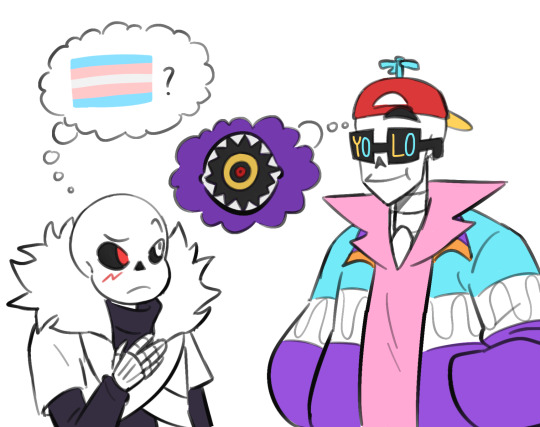
I don’t think Cross knows Fresh is a parasite
Cross belongs to Jakei95
Fresh belongs to loverofpiggies
Transcript:
Cross: Sometimes, I feel like my body doesn’t belong to me
Fresh: Yo, dats totes aight, broski, I feel da same thing!
4K notes
·
View notes
Text
You can't wipe the queerness from The Little Mermaid. It is intrinsic. It is driven by queer longing and desire.
Ready to Stand: A comic retelling The Little Mermaid with a twist 🏳️⚧️
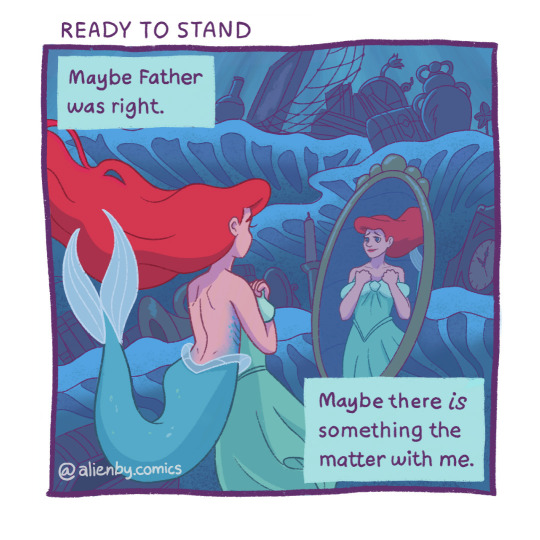
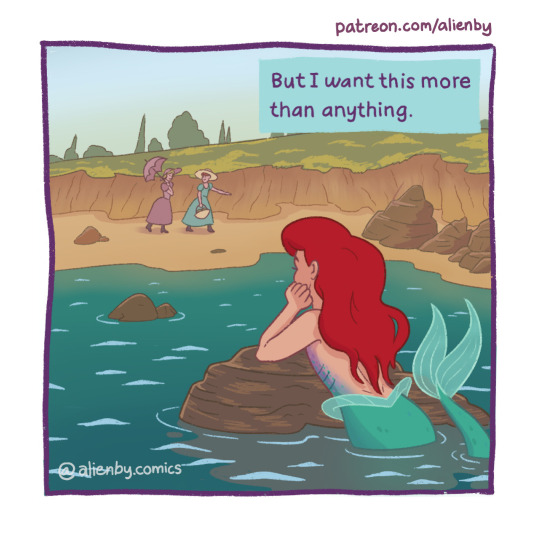
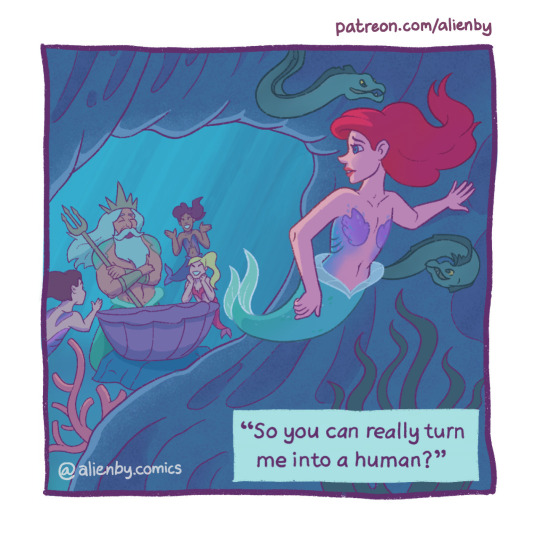
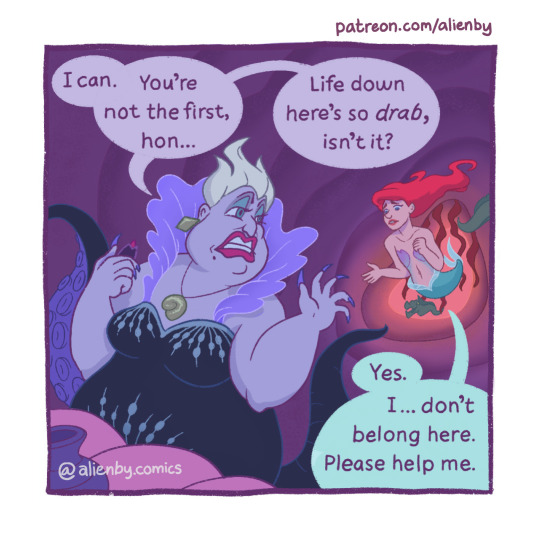
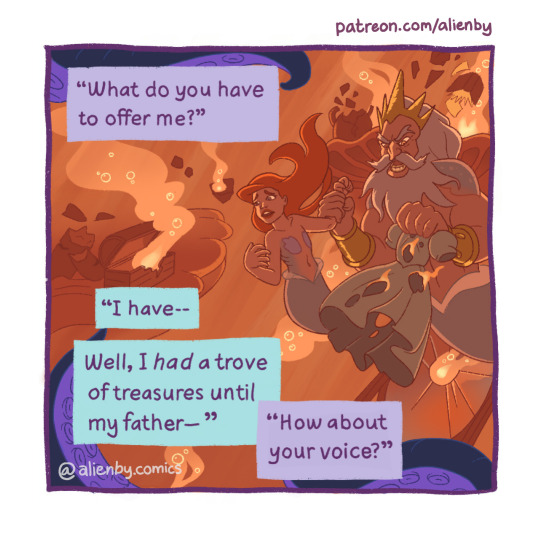
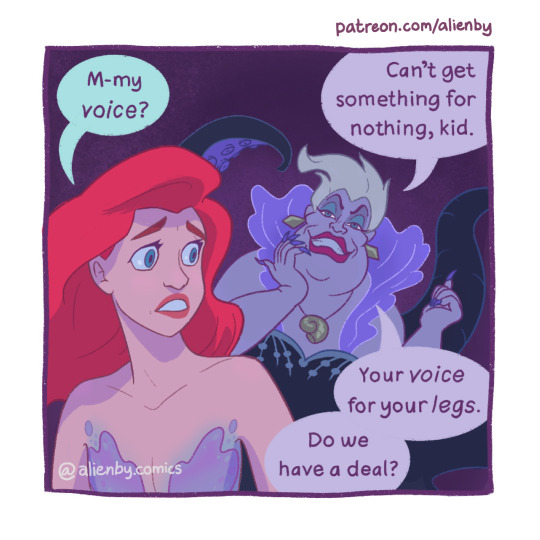
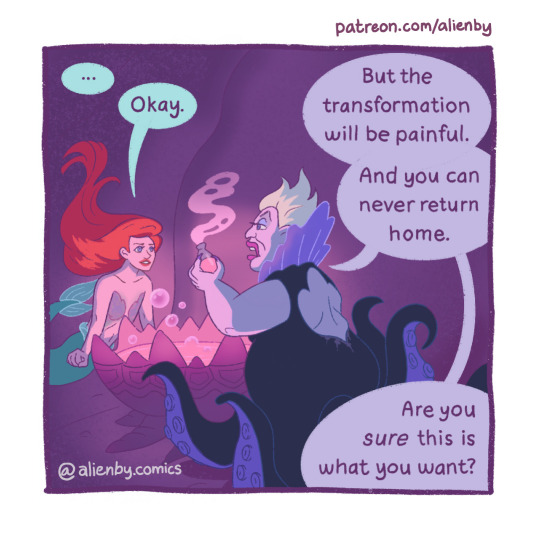

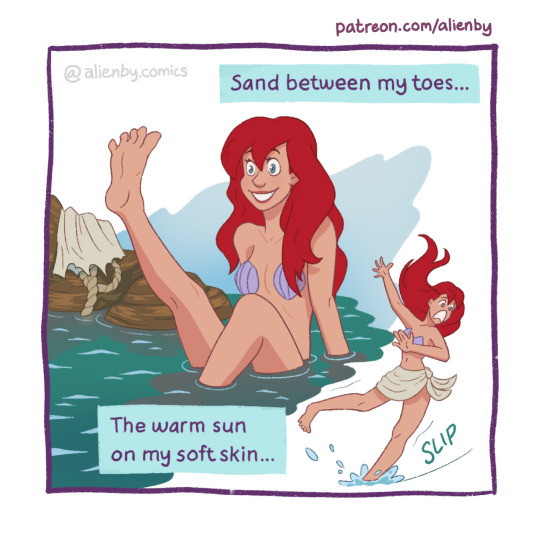
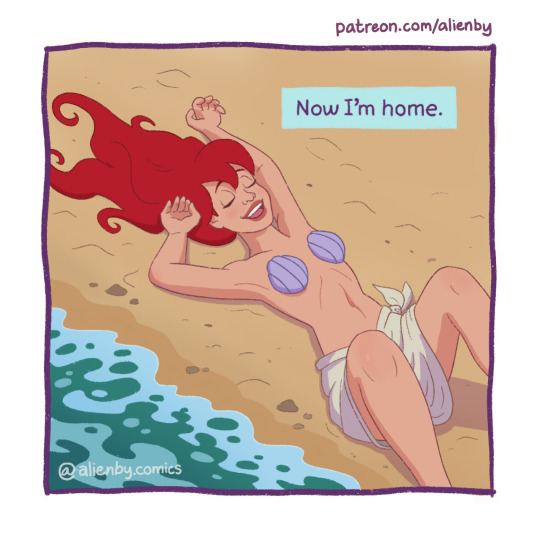
[Begin image description- Comic with 10 panels inspired by Disney’s The Little Mermaid. Comic title: “Ready to Stand” by Alienby comics.
Panel 1: Ariel, a mermaid, holds a dress up in front of her and looks into a mirror longingly. Ariel’s flat chest covered in scales and gills makes her gender ambiguous. Ariel is in her underwater cave surrounded by trinkets from the human world. Ariel’s voice over: “Maybe Father’s right. Maybe there is something wrong with me.”
Panel 2: Ariel leans on a rock on the surface of the water, looking hopefully at 2 human women walking along the beach in the distance. Ariel’s voice over: “But I want this more than anything.”
Panel 3: Ariel is seen swimming away from her home in a shadowy nook, looking back at her father and sisters, who are laughing together. She is sad to leave them. Ariel’s voice over speaking to Ursula: “So you can really turn me into a human?”
Panel 4: Ariel approaches Ursula the Sea Witch in Ursula’s lair pleadingly. Ursula speaks to Ariel over her shoulder. Ursula answers: “I can. You’re not the first, honey. Life down here is so drab, isn’t it?” Ariel replies: “Yes. I don’t belong here. Please help me.”
Panel 5: Ariel and Ursula’s conversation continues as we see a flashback of Ariel’s father Triton, who has angrily destroyed Ariel’s trinkets from the human world with his magic. Triton holds Ariel by the arm in one hand and holds her dress, which is now in shambles, in his other hand. Ursula’s voice over: “What do you have to offer me?” Ariel’s voice over: “I have… well, I had a trove of treasures until my father…” Ariel trails off. Ursula’s voice over: “How about your voice?”
Panel 6: Ariel looks over her shoulder back at Ursula. Ursula appears more devilish now and lurks in the shadows behind her. Ariel asks: “My voice?” Ursula replies: “You can’t get something for nothing, kid. Your voice for your legs. Do we have a deal?”
Panel 7: Ariel and Ursula now are at opposite sides of a bubbling purple cauldron, full of a potion that will make Ariel human. Ursula holds a vial of this potion out to Ariel. Ariel’s fists are clenched and her face is poised in resolve. Ariel simply says, “okay.” Ursula warns Ariel: “But the transformation will be painful, and you can never return home. Are you sure this is what you want?”
Panel 8: The comic cuts to after Ariel’s transformation. She breaks the surface of the ocean and takes a sharp breath of air. She no longer has gills or scales, and she now has noticeable human breasts with seashell coverings. Ariel’s inner monologue voice over: “Air in my lungs…”
Panel 9: Ariel is seen in 2 poses. The first pose shows Ariel sitting in the shallow water on the beach, admiring one of her feet on her brand new legs. She has a huge smile on her face. The second pose shows Ariel trying to stand, now wearing a skirt made from a piece of canvas from nearby ship debris. Ariel teeters and falls over with a chibi-like expression that exaggerates her panic. Ariel’s inner monologue voice over continues: “Sand between my toes, the warm sun on my soft skin…”
Panel 10: Ariel blissfully but silently laughs while laying in the warm sand on the beach. Her arms and new legs are sprawled out in relaxation. Ariel’s inner monologue concludes: “Now I’m home.” / End image description]
#trans artist#queer comics#transfem#princess ariel#trans comic#disney ariel#the little mermaid#little mermaid#mermaid art#hans christian andersen#trans coding#queer coding
2K notes
·
View notes
Text

grayfire divorce arc makes me sad so I drew them sharing freshkill at the border
#they make me insane#also theyre both so trans coded i could talk about this for days#t4t grayfire. explodes#grayfire#firegray#firestar#graystripe#warrior cats#erin hunter warriors#warriors fanart#warrior cats fanart#warriors
1K notes
·
View notes
Text

antler girl
#noelle holiday#deltarune#deltarune chapter 2#utdr#goomyart#insert shikanoko joke#TRANS CODED DEER GIRLSSSSS
2K notes
·
View notes